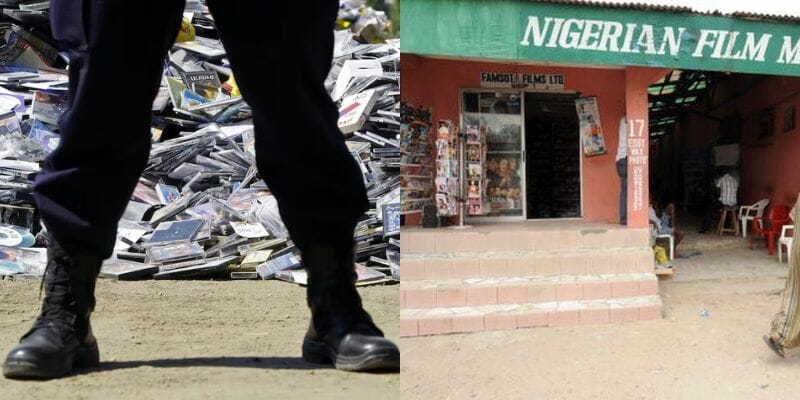
For everyone that has followed the transition of Nollywood from the old days of the likes of Keppy Ekpeyong, Richard Mofe-Damijo, and Joke Silva to the modern-day industry with the likes of Deyemi Okanlawon, Odunlade Adekola, and Segilola Ogidan, there is one vicious enemy from back them that has refused to release its claws on the neck of the industry.
Over the years, the war on piracy in Nollywood has taken huge wins, but as it is said, the modern problem requires a modern solution. As the industry continues to find new ways to tackle the problems of piracy, those who benefit from its proceeds also keep finding ways to elude being caught, continuing to rip people off their sweat.

According to a report published in 2021, a film distributor, Gabriel Okoye spoke on the effects of movie piracy on his life and that of his colleague, explaining how it made him go bankrupt while causing the early death of some.
“Piracy in Nollywood made me bankrupt.
“Many Nollywood investors died young because of frustrations inflicted by pirates. Pirates pretend to be beyond the law in Alaba, the biggest electronics market in Lagos known for piracy. They believe the market is a sovereign state within Nigeria, where copyright rules are unenforceable.”
Gabriel Okoye had taken a loan from the Bank of Industry to fund his company, but all his effort was washed down the drain by the elusiveness of movie pirates who had access to ‘Half of a Yellow Sun’ even before he was done printing. He had the same issues with ‘30 Days in Atlanta,’ plunging him deep into the dark pit of debt.
According to PriceWaterhouseCoopers – one of the Big 4 auditors in the world – in its Entertainment and Media Outlook, African perspective, covering 2017 to 2021 “Total cinema revenue is set to reach $22m in 2021, rising at 8.6 percent compound annual growth rate over the forecast period as Nigerian films gain international recognition and investment increases.”
However, Nigeria was losing $1 billion to piracy, according to the Nigerian Copyright Commission.
In addition, according to the NCC’s 2017 annual report, which was published in February 2018, its operatives carried out 49 strategic operations and 99 anti-piracy surveillance in specific locations across the nation during the year under review, during which they were able to apprehend 70 suspected pirates and recover 1,301,649 quantities of pirated copyright works, including DVDs and CDs, all worth N1.26 billion.

What is the government doing about piracy in Nollywood?
Despite its implications on the country’s economy and the psychological effects it has on filmmakers and distributors, the government does not seem to see it as a big deal. In fact, the laws guiding this menace and punishments put in place for piracy seems like a slap on the wrist.
According to the Copyright Act, Chapter C28, Laws of the Federal Republic of Nigeria 2004, anyone charged with pirating cinematograph films, musical works, sound recordings, etc. is only subject to a fine of N100 – N1,000 for each copy dealt with, terms not exceeding five years in prison, or both.
For an act as criminal as piracy that plunges people into debts running into millions, this punishment does not seem to be sufficient.
Way Forward
The only way forward to curb the menace of piracy in Nollywood is a stringent anti-piracy law that expands the scope of piracy and tackles it adequately. For example, the 2017 Copyright Bill approved by the Federal Executive Council has been passed by the two chambers and is now awaiting transmission and assent from the President.
According to reports, the bill addressed four treaties in the field of copyright with the intention of bringing the country’s intellectual property laws to international standards. Also, The PUNCH reported that major players in the industry made their inputs in the new bill, expressing hope that the provisions, when passed into law, would severely punish pirates.
Conclusion
Piracy in Nollywood is a huge problem, and considering how long it has hindered the development of the industry, it is a problem that needs to be properly addressed and dealt with. Without a permanent solution to this problem, filmmakers, film distributors, and investors will continue to be frustrated, and lose money to the menace of piracy.

Leave a Reply